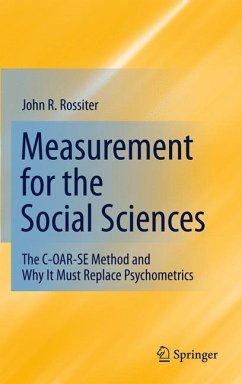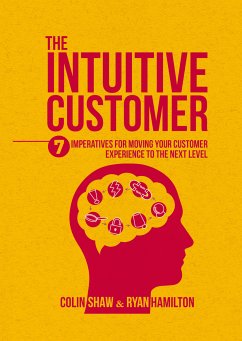
Measurement for the Social Sciences (eBook, PDF)
The C-OAR-SE Method and Why It Must Replace Psychometrics
Versandkostenfrei!
Sofort per Download lieferbar
72,95 €
inkl. MwSt.
Weitere Ausgaben:

PAYBACK Punkte
36 °P sammeln!
This book proposes a revolutionary new theory of construct measurement - called C-OAR-SE - for the social sciences. The acronym is derived from the following key elements: construct definition; object representation; attribute classification; rater entity identification; selection of item type; enumeration and scoring. The new theory is applicable to the design of measures of constructs in: . Management . Marketing . Information Systems . Organizational Behavior . Psychology . Sociology C-OAR-SE is a rationally rather than empirically-based theory and procedure. It can be used for designing me...
This book proposes a revolutionary new theory of construct measurement - called C-OAR-SE - for the social sciences. The acronym is derived from the following key elements: construct definition; object representation; attribute classification; rater entity identification; selection of item type; enumeration and scoring. The new theory is applicable to the design of measures of constructs in: . Management . Marketing . Information Systems . Organizational Behavior . Psychology . Sociology C-OAR-SE is a rationally rather than empirically-based theory and procedure. It can be used for designing measures of the most complex and also the most basic constructs that we use in social science research. C-OAR-SE is a radical alternative to the traditional empirically-based psychometric approach, and a considerable amount of the book's content is devoted to demonstrating why the psychometric approach does not produce valid measures. The book argues that the psychometric approach has resulted in many misleading findings in the social sciences and has led to erroneous acceptance - or rejection - of many of our main theories and hypotheses, and that the C-OAR-SE approach to measurement would correct this massive problem. The main purpose of this book is to introduce and explain C-OAR-SE construct measurement theory in a way that will be understood by all social science researchers and that can be applied to designing new, more valid measures. Featuring numerous examples, practical applications, end-of-chapter questions, and appendices, the book will serve as an essential resource for students and professional researcher alike.
Dieser Download kann aus rechtlichen Gründen nur mit Rechnungsadresse in A, B, BG, CY, CZ, D, DK, EW, E, FIN, F, GR, HR, H, IRL, I, LT, L, LR, M, NL, PL, P, R, S, SLO, SK ausgeliefert werden.












